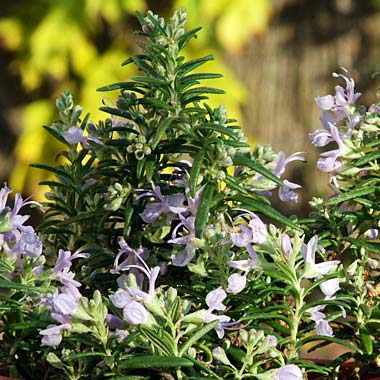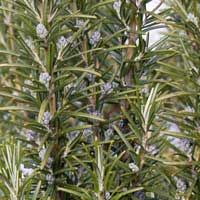


Prostrate or Creeping Rosemary
Salvia rosmarinus Prostratus group

Like all rosemarys this herb is an evergreen perennial.
It has low trailing growth and from early spring onwards the arching stems are covered with abundant sky blue flowers.
With a little shelter and protection this rosemary can grow to cover an area of up to 90cm across.
Its attractive arching stems make it ideal for planting in hanging baskets and containers,
and also on banks, walls and in rock gardens.
This is one of the earliest flowering cultivars of rosemary, with mild weather
and a sheltered spot the flowers may start to open soon after Christmas.
By early spring the stems are covered with masses of sky blue flowers.
The plants should be pruned after flowering to encourage new bushy growth,
but do not so hard as to cut into the old wood. Like all rosemarys they dislike cold and wet conditions.
Rosemary is a well-known herb with a multitude of culinary, medicinal and cosmetic uses.
It is perfect with meats especially lamb, in soups and stews and with meaty fish such as halibut.
It is best used either as large sprigs that can be removed before serving or as finely chopped young leaves.
The flavour transfers well to oils and vinegars to use in salads and with pasta.
In addition to its savoury uses, rosemary can be used with fruit and in jam, and also in home baking with delicious results.
Mulled Cider
Try our recipe for mulled cider, it makes a inviting change from mulled wine.
Great to welcome guests with to a Christmas party.

- ½ pint of dry cider
- 4 sprigs of rosemary
- 1 small cinnamon stick
- 3 tsp brown sugar
- 3 tbs dark or golden rum
Method:
- Bruise the rosemary in the cider in a large pestle and mortar (or improvise with the end of a rolling pin and a plastic basin).
- Stir in the sugar and the cinnamon and leave to infuse for 15 minutes.
- Strain the cider off and heat until it is very hot. Traditionally this should be done with a red hot poker, but a microwave or a saucepan will do very well as a substitute.
Whilst researching mulled cider we came across a very interesting and also seasonal concept: You might also like to try 'Fire Cider'.
Medically the uses of rosemary are extensive, it is said to help circulation and digestive problems,
alleviate migraine and headaches and help lift depression, to name but a few.
However excessive use should be avoided during pregnancy.
Rosmarinus comes from the Latin ros marinus meaning 'dew of the sea'
which precisely describes the appearance of the blue flowers when viewed from a distance.